Burt A. The Evolution of the British Empire and Commonwealth From the American Revolution
Подождите немного. Документ загружается.

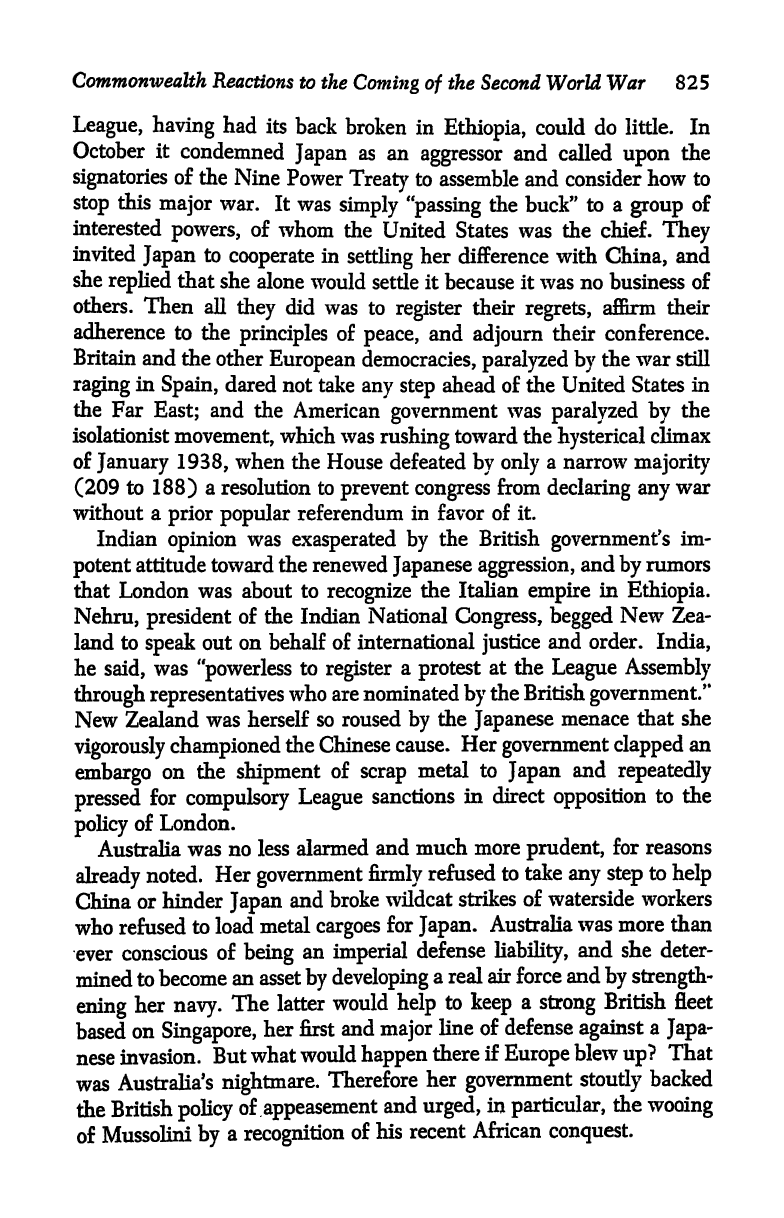
Commonwealth
Reactions
to
the
Coming of
the Second
World War
825
League,
having
had
its
back
broken in
Ethiopia,
could do
little. In
October it
condemned
Japan
as an
aggressor
and
called
upon
the
signatories
of
the
Nine
Power
Treaty
to
assemble
and consider
how to
stop
this
major
war.
It
was
simply
"passing
the buck"
to
a
group
of
interested
powers,
of
whom
the
United States was
the
chief.
They
invited
Japan
to
cooperate
in
settling
her
difference with
China,
and
she
replied
that she
alone
would settle it because it was no business of
others.
Then
all
they
did was to
register
their
regrets,
affirm
their
adherence
to the
principles
of
peace,
and
adjourn
their
conference.
Britain
and
the other
European
democracies,
paralyzed
by
the
war
still
raging
in
Spain,
dared
not
take
any
step
ahead of
the
United
States
in
the
Far
East;
and the
American
government
was
paralyzed
by
the
isolationist
movement,
which
was
rushing
toward the
hysterical
climax
of
January
1938,
when the
House defeated
by only
a narrow
majority
(209
to
188)
a
resolution to
prevent
congress
from
declaring any
war
without
a
prior
popular
referendum
in favor of it.
Indian
opinion
was
exasperated by
the
British
government's
im-
potent
attitude toward
the renewed
Japanese aggression,
and
by
rumors
that London was about
to
recognize
the Italian
empire
in
Ethiopia.
Nehru,
president
of the Indian
National
Congress, begged
New
Zea-
land to
speak
out
on behalf
of
international
justice
and order.
India,
he
said,
was
"powerless
to
register
a
protest
at
the
League
Assembly
through
representatives
who are nominated
by
the
British
government/*
New
Zealand
was herself
so roused
by
the
Japanese
menace
that she
vigorously
championed
the Chinese
cause.
Her
government
clapped
an
embargo
on
the
shipment
of
scrap
metal
to
Japan
and
repeatedly
pressed
for
compulsory
League
sanctions
in direct
opposition
to the
policy
of
London.
Australia
was no less
alarmed
and
much
more
prudent,
for reasons
already
noted.
Her
government
firmly
refused
to
take
any
step
to
help
China
or
hinder
Japan
and
broke
wildcat strikes
of
waterside workers
who
refused
to
load
metal
cargoes
for
Japan.
Australia was
more than
ever
conscious
of
being
an
imperial
defense
liability,
and she deter-
mined
to
become
an
asset
by
developing
a real
air force and
by
strength-
ening
her
navy.
The
latter
would
help
to
keep
a
strong
British
fleet
based
on
Singapore,
her
first
and
major
line
of
defense
against
a
Japa-
nese
invasion.
But
what
would
happen
there
if
Europe
blew
up?
That
was
Australia's
nightmare.
Therefore
her
government
stoutly
backed
the
British
policy
of
appeasement
and
urged,
in
particular,
the
wooing
of
Mussolini
by
a
recognition
of
his recent
African
conquest.
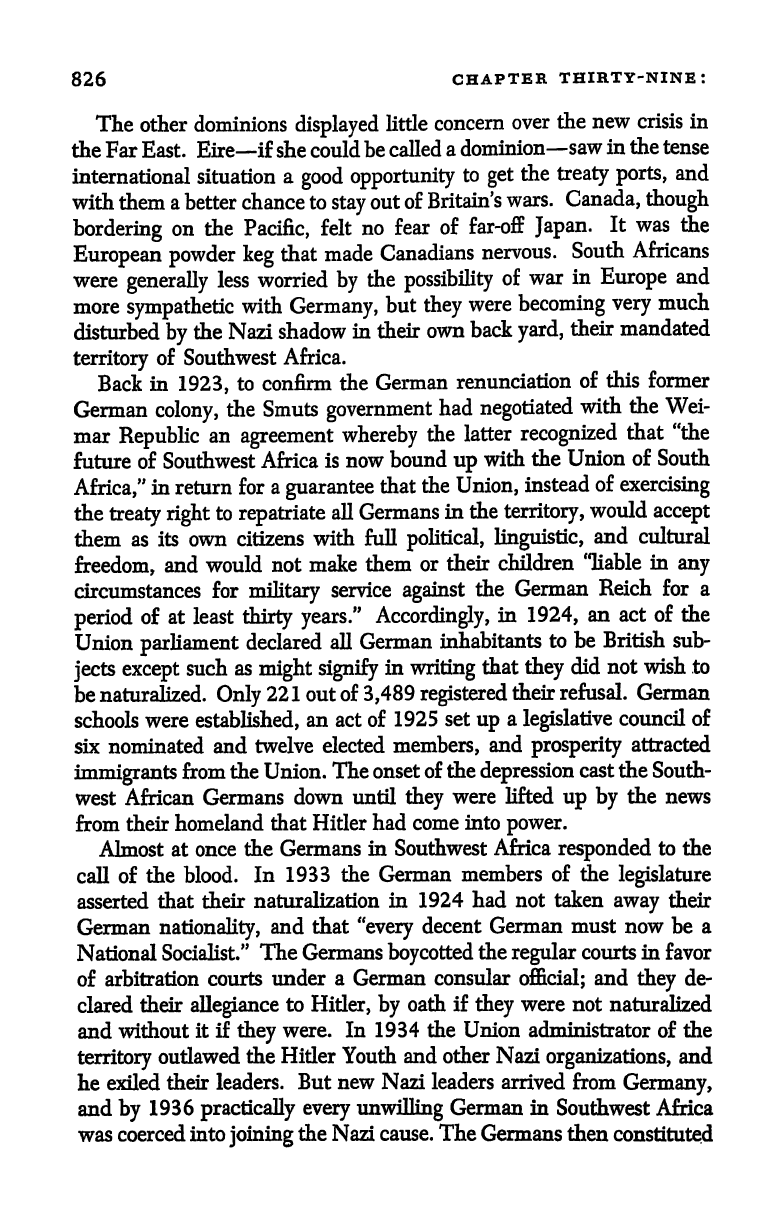
826
CHAPTER
THIRTY-NINE:
The
other
dominions
displayed
little
concern
over
the
new crisis
in
the Far East. Eire if she could
be
called
a dominion
saw
in
the
tense
international
situation
a
good
opportunity
to
get
the
treaty ports,
and
with
them
a
better
chance
to
stay
out
of
Britain's
wars.
Canada,
though
bordering
on the
Pacific,
felt
no
fear
of
far-off
Japan.
It was
the
European
powder
keg
that
made
Canadians
nervous.
South Africans
were
generally
less worried
by
the
possibility
of
war
in
Europe
and
more
sympathetic
with
Germany,
but
they
were
becoming
very
much
disturbed
by
the
Nazi shadow
in
their
own
back
yard,
their mandated
territory
of Southwest
Africa.
Back
in
1923,
to confirm
the
German
renunciation
of
this former
German
colony,
the
Smuts
government
had
negotiated
with
the
Wei-
mar
Republic
an
agreement
whereby
the latter
recognized
that "the
future of Southwest
Africa
is
now
bound
up
with
the Union
of
South
Africa,"
in
return
for
a
guarantee
that
the
Union,
instead
of
exercising
the
treaty right
to
repatriate
all Germans
in the
territory,
would
accept
them as
its own
citizens
with full
political,
linguistic,
and
cultural
freedom,
and
would
not
make
them or
their
children
"liable
in
any
circumstances
for
military
service
against
the German
Reich
for a
period
of
at least
thirty years."
Accordingly,
in
1924,
an act of the
Union
parliament
declared
all German
inhabitants
to be
British sub-
jects
except
such
as
might
signify
in
writing
that
they
did not
wish to
be
naturalized.
Only
22 lout
of
3,489
registered
their
refusal.
German
schools
were
established,
an act of
1925
set
up
a
legislative
council of
six
nominated
and twelve
elected
members,
and
prosperity
attracted
immigrants
from
the Union.
The onset
of
the
depression
cast the South-
west
African
Germans
down until
they
were
lifted
up by
the news
from
their
homeland
that Hitler
had
come
into
power.
Almost
at once
the Germans
in Southwest
Africa
responded
to the
call
of
the blood.
In
1933 the
German
members
of
the
legislature
asserted
that
their
naturalization
in 1924 had
not
taken
away
their
German
nationality,
and
that
"every
decent German
must
now be a
National
Socialist."
The Germans
boycotted
the
regular
courts in
favor
of
arbitration
courts
under
a
German
consular
official;
and
they
de-
clared
their
allegiance
to
Hitler,
by
oath if
they
were not
naturalized
and
without
it if
they
were. In 1934 the Union
administrator of
the
territory
outlawed
the
Hitler
Youth and
other Nazi
organizations,
and
he
exiled
their
leaders. But
new Nazi
leaders
arrived from
Germany,
and
by
1936
practically
every
unwilling
German in
Southwest Africa
was coerced
into
joining
the
Nazi
cause. The
Germans then
constituted
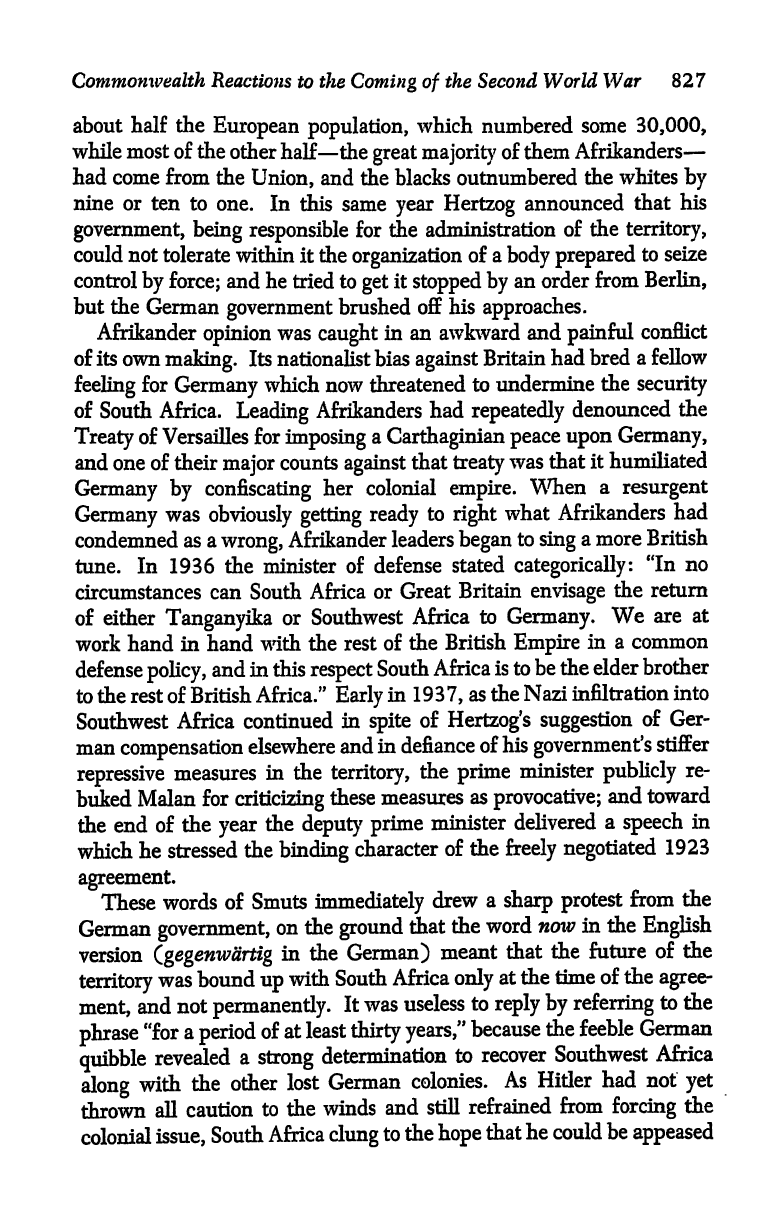
Commomvealth
Reactions
to the
Coming
of
the Second World War
827
about
half
the
European
population,
which numbered
some
30,000,
while most of the
other
half the
great
majority
of them
Afrikanders
had come from
the
Union,
and
the blacks outnumbered
the
whites
by
nine or ten
to one.
In this
same
year Hertzog
announced
that his
government,
being
responsible
for
the administration
of
the
territory,
could not
tolerate
within
it
the
organization
of
a
body prepared
to
seize
control
by
force;
and
he
tried to
get
it
stopped by
an
order
from
Berlin,
but
the
German
government
brushed
off
his
approaches.
Afrikander
opinion
was
caught
in an awkward
and
painful
conflict
of its
own
making.
Its nationalist bias
against
Britain
had
bred
a
fellow
feeling
for
Germany
which
now
threatened
to
undermine
the
security
of
South Africa.
Leading
Afrikanders
had
repeatedly
denounced
the
Treaty
of Versailles for
imposing
a
Carthaginian
peace
upon
Germany,
and
one
of their
major
counts
against
that
treaty
was
that it
humiliated
Germany by
confiscating
her
colonial
empire.
When
a
resurgent
Germany
was
obviously getting
ready
to
right
what
Afrikanders
had
condemned
as a
wrong,
Afrikander
leaders
began
to
sing
a more
British
tune. In 1936
the
minister
of
defense
stated
categorically:
"In no
circumstances
can South
Africa
or
Great
Britain
envisage
the
return
of
either
Tanganyika
or Southwest
Africa
to
Germany,
We
are
at
work
hand in hand
with
the
rest
of
the
British
Empire
in
a common
defense
policy,
and in
this
respect
South
Africa
is to
be
the elder
brother
to the
rest of
British
Africa."
Early
in
1937,
as
the
Nazi infiltration
into
Southwest
Africa continued
in
spite
of
Hertzog's
suggestion
of Ger-
man
compensation
elsewhere
and
in defiance
of
his
government's
stiffer
repressive
measures
in
the
territory,
the
prime
minister
publicly
re-
buked
Malan
for
criticizing
these measures
as
provocative;
and toward
the
end
of
the
year
the
deputy
prime
minister
delivered
a
speech
in
which
he
stressed
the
binding
character
of the
freely negotiated
1923
agreement.
These
words
of
Smuts
immediately
drew
a
sharp protest
from
the
German
government,
on
the
ground
that
the
word
now in
the
English
version
(gegenwiirtig
in the
German)
meant
that the
future
of
the
territory
was bound
up
with South
Africa
only
at the
time of
the
agree-
ment,
and
not
permanently.
It
was
useless
to
reply
by
referring
to the
phrase
"for
a
period
of
at least
thirty years,"
because
the feeble German
quibble
revealed
a
strong
determination
to
recover
Southwest
Africa
along
with
the
other
lost
German
colonies.
As
Hitler had
not
yet
thrown
all caution
to the
winds
and
still
refrained
from
forcing
the
colonial
issue,
South
Africa
clung
to
the
hope
that
he
could
be
appeased
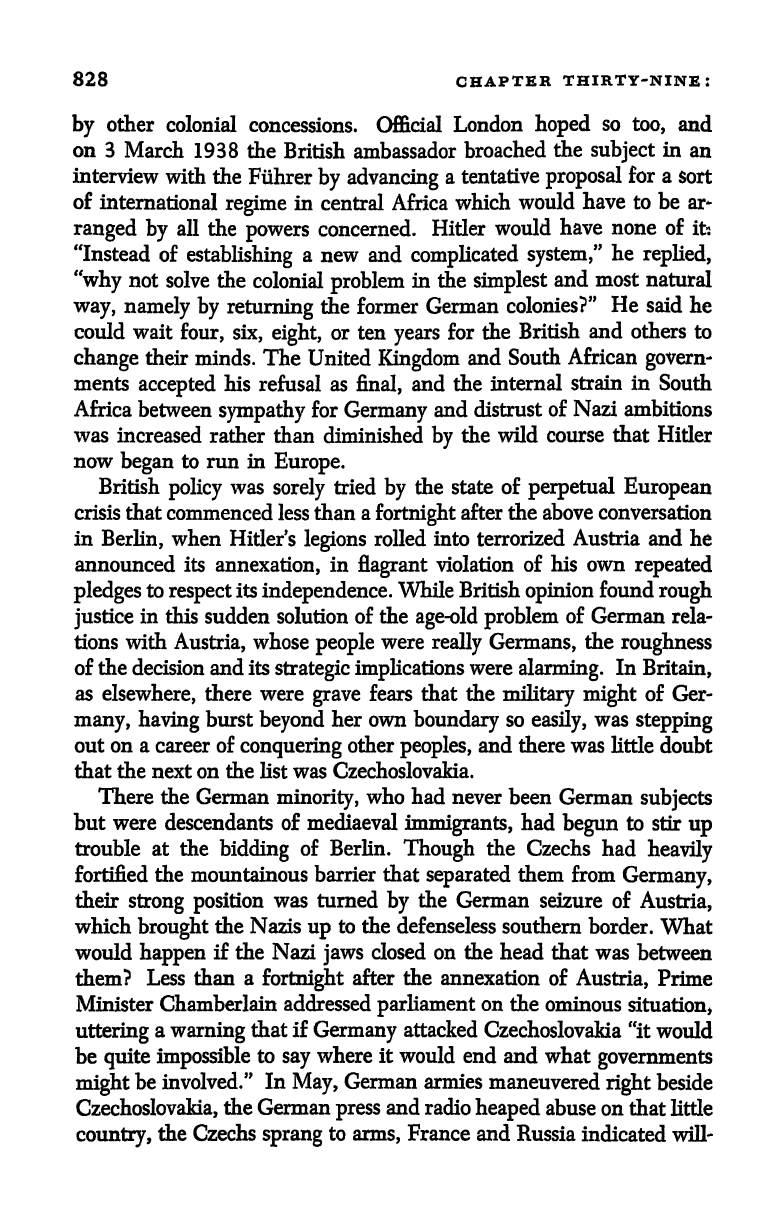
828
CHAPTER
THIRTY-NINE:
by
other
colonial
concessions. Official
London
hoped
so
too,
and
on
3
March
1938 the
British ambassador
broached
the
subject
in
an
interview
with the
Fiihrer
by
advancing
a
tentative
proposal
for a
sort
of
international
regime
in
central
Africa
which
would
have
to
be
ar-
ranged by
all
the
powers
concerned.
Hitler would
have none
of
ifc
"Instead
of
establishing
a
new and
complicated
system,"
he
replied,
"why
not
solve the
colonial
problem
in the
simplest
and most
natural
way,
namely
by
returning
the former German
colonies?"
He
said
he
could
wait
four, six,
eight,
or ten
years
for the
British
and
others
to
change
their minds.
The United
Kingdom
and South
African
govern-
ments
accepted
his refusal as
final,
and
the
internal
strain
in
South
Africa between
sympathy
for
Germany
and
distrust
of Nazi
ambitions
was
increased rather than
diminished
by
the wild
course
that
Hitler
now
began
to
run in
Europe.
British
policy
was
sorely
tried
by
the state
of
perpetual
European
crisis that
commenced less
than
a
fortnight
after the
above
conversation
in
Berlin,
when
Hitler's
legions
rolled
into
terrorized
Austria
and he
announced its
annexation,
in
flagrant
violation
of his
own
repeated
pledges
to
respect
its
independence.
While
British
opinion
found
rough
justice
in this
sudden solution
of the
age-old problem
of
German rela-
tions with
Austria,
whose
people
were
really
Germans,
the
roughness
of the decision and its
strategic
implications
were
alarming.
In
Britain,
as
elsewhere,
there
were
grave
fears
that the
military
might
of Ger-
many, having
burst
beyond
her own
boundary
so
easily,
was
stepping
out
on a
career
of
conquering
other
peoples,
and there was
little doubt
that the next on
the
list
was
Czechoslovakia.
There
the German
minority,
who had never
been
German
subjects
but
were
descendants of mediaeval
immigrants,
had
begun
to stir
up
trouble
at the
bidding
of Berlin.
Though
the
Czechs
had
heavily
fortified
the
mountainous
barrier
that
separated
them
from
Germany,
their
strong position
was turned
by
the
German seizure
of
Austria,
which
brought
the Nazis
up
to the
defenseless southern
border.
What
would
happen
if
the
Nazi
jaws
closed
on the
head that was
between
them?
Less
than a
fortnight
after
the
annexation of
Austria,
Prime
Minister
Chamberlain
addressed
parliament
on the
ominous
situation,
uttering
a
warning
that if
Germany
attacked
Czechoslovakia
"it
would
be
quite
impossible
to
say
where
it
would end
and what
governments
might
be involved."
In
May,
German armies
maneuvered
right
beside
Czechoslovakia,
the German
press
and
radio
heaped
abuse
on
that
little
country,
the Czechs
sprang
to
arms,
France
and Russia
indicated
will-
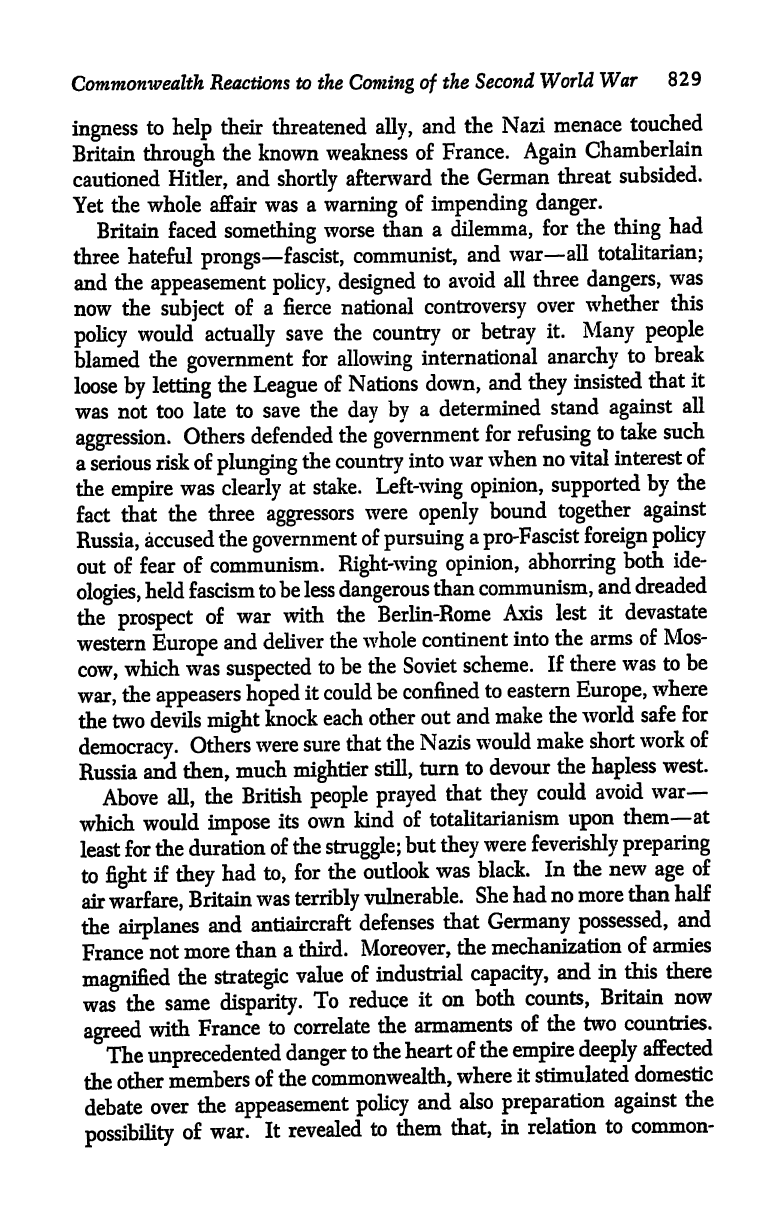
Commonwealth
Reactions
to the
Coming
of
the
Second
World
War
829
ingness
to
help
their
threatened
ally,
and
the
Nazi
menace
touched
Britain
through
the known
weakness
of
France.
Again
Chamberlain
cautioned
Hitler,
and
shortly
afterward
the
German
threat
subsided.
Yet
the
whole affair was
a
warning
of
impending
danger.
Britain
faced
something
worse
than
a
dilemma,
for
the
thing
had
three
hateful
prongs
fascist,
communist,
and
war
all
totalitarian;
and
the
appeasement
policy,
designed
to
avoid
all
three
dangers,
was
now
the
subject
of
a
fierce
national
controversy
over
whether
this
policy
would
actually
save
the
country
or
betray
it.
Many
people
blamed
the
government
for
allowing
international
anarchy
to
break
loose
by
letting
the
League
of
Nations
down,
and
they
insisted
that
it
was
not
too late
to save
the
day
by
a determined
stand
against
all
aggression.
Others
defended
the
government
for
refusing
to
take
such
a serious
risk of
plunging
the
country
into
war
when
no
vital
interest
of
the
empire
was
clearly
at
stake.
Left-wing
opinion,
supported
by
the
fact
that
the
three
aggressors
were
openly
bound
together
against
Russia,
accused
the
government
of
pursuing
a
pro-Fascist
foreign
policy
out
of
fear
of
communism.
Right-wing
opinion,
abhorring
both
ide-
ologies,
held
fascism
to
be
less
dangerous
than
communism,
and
dreaded
the
prospect
of
war
with
the
Berlin-Rome
Axis
lest
it
devastate
western
Europe
and
deliver
the
whole
continent
into
the
arms
of
Mos-
cow,
which
was
suspected
to
be
the
Soviet
scheme.
If
there
was
to
be
war,
the
appeasers
hoped
it could
be
confined
to
eastern
Europe,
where
the
two
devils
might
knock
each
other
out
and
make
the
world
safe
for
democracy.
Others
were
sure
that
the
Nazis
would
make
short
work
of
Russia
and
then,
much
mightier
still,
turn
to
devour
the
hapless
west.
Above
all,
the
British
people
prayed
that
they
could
avoid
war
which
would
impose
its
own
kind
of
totalitarianism
upon
them
at
least
for
the
duration
of
the
struggle;
but
they
were
feverishly preparing
to
fight
if
they
had
to,
for
the
outlook
was
black.
In
the
new
age
of
air
warfare,
Britain
was
terribly
vulnerable.
She
had
no
more
than
half
the
airplanes
and
antiaircraft
defenses
that
Germany
possessed,
and
France
not
more
than
a
third.
Moreover,
the mechanization
of
armies
magnified
the
strategic
value
of
industrial
capacity,
and
in
this there
was
the
same
disparity.
To
reduce
it on
both
counts,
Britain now
agreed
with
France
to
correlate
the
armaments
of
the
two
countries.
The
unprecedented
danger
to
the
heart
of
the
empire
deeply
affected
the
other
members
of
the
commonwealth,
where
it
stimulated
domestic
debate
over
the
appeasement
policy
and
also
preparation
against
the
possibility
of
war.
It
revealed
to
them
that,
in
relation
to
common-
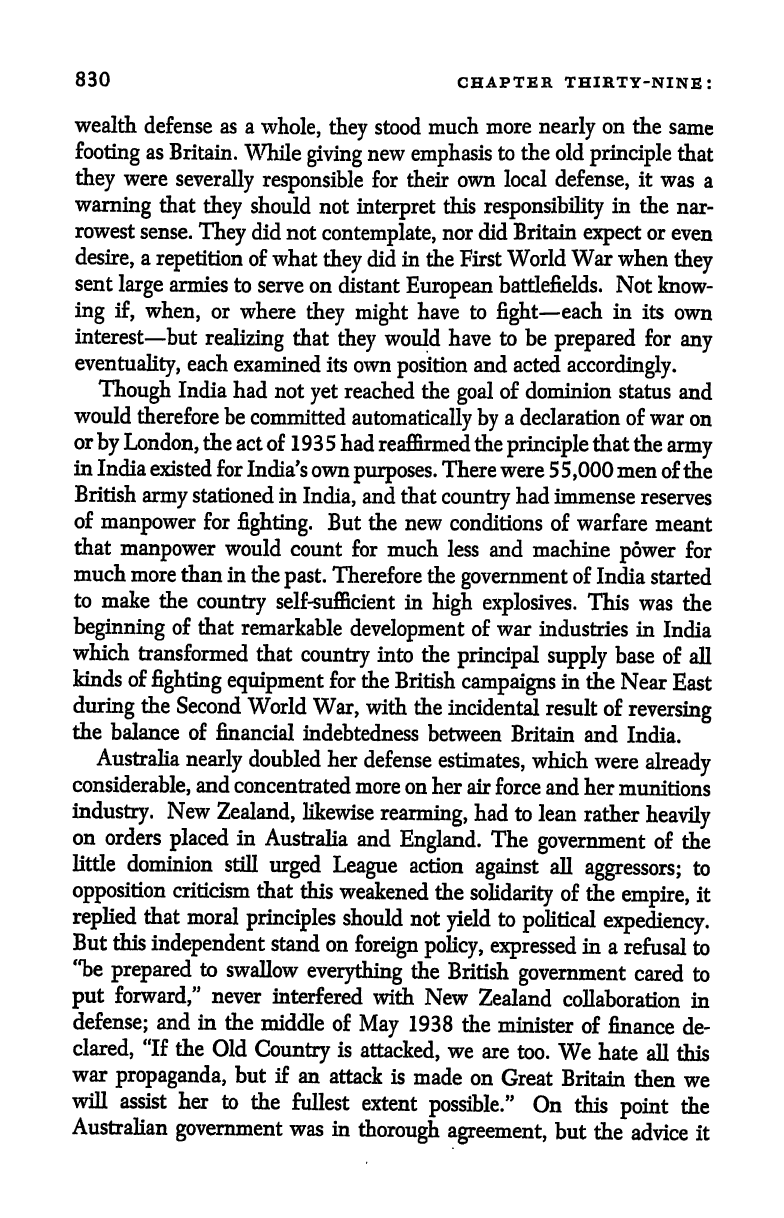
830
CHAPTER
THIRTY-NINE:
wealth
defense
as a
whole,
they
stood
much
more
nearly
on
the
same
footing
as
Britain.
While
giving
new
emphasis
to
the
old
principle
that
they
were
severally
responsible
for
their own
local
defense,
it
was
a
warning
that
they
should not
interpret
this
responsibility
in
the
nar-
rowest
sense.
They
did
not
contemplate,
nor did
Britain
expect
or
even
desire,
a
repetition
of what
they
did in tie First
World
War
when
they
sent
large
armies
to serve
on
distant
European
battlefields.
Not know-
ing
if,
when,
or where
they
might
have
to
fight
each in
its
own
interest
but
realizing
that
they
would
have
to
be
prepared
for
any
eventuality,
each
examined
its own
position
and
acted
accordingly.
Though
India
had
not
yet
reached
the
goal
of dominion
status
and
would
therefore
be
committed
automatically
by
a
declaration of
war
on
or
by
London,
the act
of 1 93
5
had reaffirmed the
principle
that
the
army
in
India
existed
for
India's own
purposes.
There
were 5 5
,000
men
of
the
British
army
stationed in
India,
and that
country
had
immense
reserves
of
manpower
for
fighting.
But
the new
conditions of
warfare
meant
that
manpower
would
count for
much less and
machine
power
for
much
more than
in
the
past.
Therefore the
government
of
India
started
to
make
the
country
self-sufficient in
high explosives.
This
was
the
beginning
of
that
remarkable
development
of
war
industries
in
India
which
transformed
that
country
into the
principal
supply
base
of
all
kinds
of
fighting
equipment
for
the British
campaigns
in the
Near
East
during
the
Second
World
War,
with the
incidental
result of
reversing
the
balance of
financial
indebtedness
between
Britain
and
India.
Australia
nearly
doubled
her
defense
estimates,
which
were
already
considerable,
and
concentrated more
on her
air
force
and her
munitions
industry.
New
Zealand,
likewise
rearming,
had to lean
rather
heavily
on
orders
placed
in
Australia
and
England.
The
government
of
the
little
dominion
still
urged
League
action
against
all
aggressors;
to
opposition
criticism that
this
weakened the
solidarity
of
the
empire,
it
replied
that
moral
principles
should not
yield
to
political
expediency.
But this
independent
stand on
foreign policy,
expressed
in
a
refusal
to
"be
prepared
to
swallow
everything
the
British
government
cared
to
put
forward,"
never
interfered
with
New
Zealand
collaboration in
defense;
and
in the
middle
of
May
1938
the
minister
of
finance
de-
clared,
"If
the
Old
Country
is
attacked,
we
are
too.
We
hate
all this
war
propaganda,
but if
an
attack
is
made
on
Great
Britain
then
we
will assist
her
to the
fullest
extent
possible."
On
this
point
the
Australian
government
was
in
thorough
agreement,
but
the
advice
it
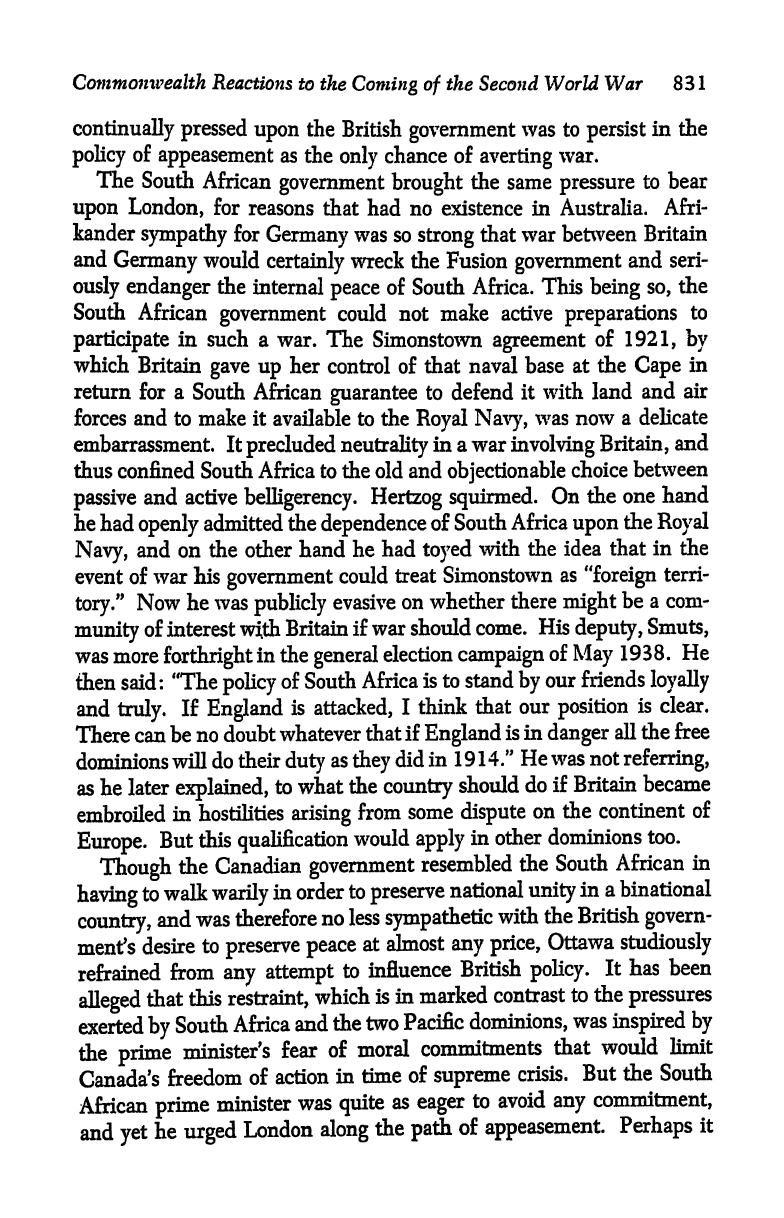
Commonwealth
Reactions
to
the
Coming
of
the Second World
War 831
continually
pressed
upon
the
British
government
was to
persist
in the
policy
of
appeasement
as
the
only
chance
of
averting
war.
The
South
African
government
brought
the
same
pressure
to bear
upon
London,
for
reasons
that
had
no
existence
in
Australia.
Afri-
kander
sympathy
for
Germany
was
so
strong
that
war between
Britain
and
Germany
would
certainly
wreck
the Fusion
government
and
seri-
ously
endanger
the
internal
peace
of
South
Africa.
This
being
so,
the
South
African
government
could not
make active
preparations
to
participate
in such
a war. The
Simonstown
agreement
of
1921,
by
which
Britain
gave up
her
control of that
naval
base
at
the
Cape
in
return
for
a
South African
guarantee
to defend
it
with
land
and
air
forces
and
to
make it
available to
the
Royal
Navy,
was
now
a delicate
embarrassment.
It
precluded neutrality
in a war
involving
Britain,
and
thus
confined South
Africa
to
the old and
objectionable
choice
between
passive
and active
belligerency.
Hertzog
squirmed.
On
the one
hand
he had
openly
admitted the
dependence
of
South
Africa
upon
the
Royal
Navy,
and
on
the other hand
he
had
toyed
with the idea
that
in the
event of
war his
government
could
treat Simonstown
as
"foreign
terri-
tory."
Now he
was
publicly
evasive
on
whether
there
might
be
a
com-
munity
of
interest with
Britain
if war should
come.
His
deputy,
Smuts,
was
more
forthright
in the
general
election
campaign
of
May
1938.
He
then said:
"The
policy
of South
Africa
is to stand
by
our
friends
loyally
and
truly.
If
England
is
attacked,
I
think
that our
position
is clear.
There
can
be no doubt
whatever
that
if
England
is
in
danger
all the
free
dominions
will
do
their
duty
as
they
did
in
1914."
He
was not
referring,
as he
later
explained,
to
what
the
country
should
do
if
Britain
became
embroiled
in hostilities
arising
from
some
dispute
on
the continent
of
Europe.
But
this
qualification
would
apply
in other
dominions
too.
Though
the
Canadian
government
resembled
the
South
African
in
having
to
walk
warily
in order
to
preserve
national
unity
in a binational
country,
and
was
therefore
no
less
sympathetic
with the
British
govern-
ment's
desire
to
preserve
peace
at
almost
any
price,
Ottawa
studiously
refrained
from
any
attempt
to
influence
British
policy.
It
has been
alleged
that
this
restraint,
which
is
in
marked
contrast
to
the
pressures
exerted
by
South
Africa
and
the two
Pacific
dominions,
was
inspired
by
the
prime
minister's
fear
of
moral
commitments
that
would
limit
Canada's
freedom
of
action
in
time
of
supreme
crisis.
But
the South
African
prime
minister
was
quite
as
eager
to
avoid
any
commitment,
and
yet
he
urged
London
along
the
path
of
appeasement.
Perhaps
it
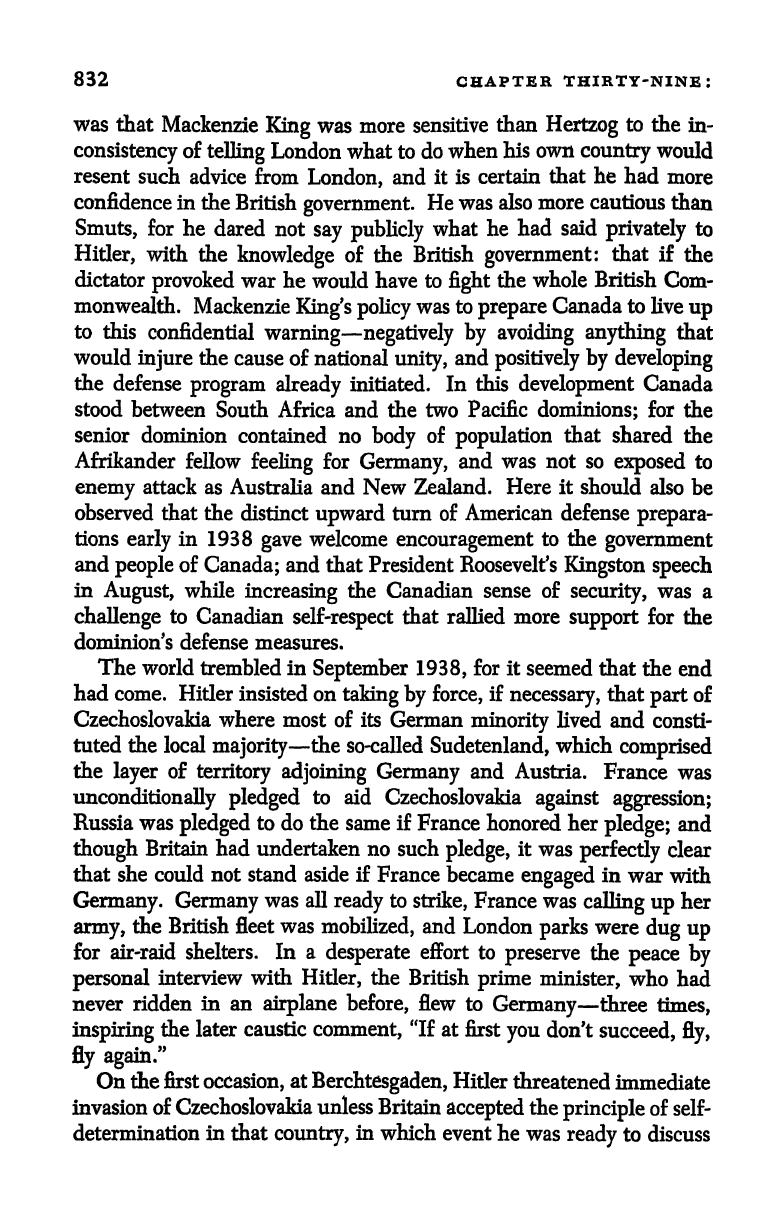
832
CHAPTER
THIRTY-NINE:
was
that
Mackenzie
King
was
more sensitive
than
Hertzog
to
the
in-
consistency
of
telling
London what to do
when
his
own
country
would
resent such
advice
from
London,
and
it
is
certain
that he
had
more
confidence in
the
British
government.
He
was
also
more cautious
than
Smuts,
for
he
dared
not
say
publicly
what
he
had said
privately
to
Hitler,
with the
knowledge
of the
British
government:
that
if
the
dictator
provoked
war
he would
have to
fight
the
whole
British
Com-
monwealth. Mackenzie
King's policy
was
to
prepare
Canada
to
live
up
to
this
confidential
warning
negatively
by
avoiding
anything
that
would
injure
the
cause
of national
unity,
and
positively
by
developing
the
defense
program
already
initiated.
In this
development
Canada
stood
between
South
Africa and the
two
Pacific
dominions;
for
the
senior
dominion contained no
body
of
population
that
shared the
Afrikander
fellow
feeling
for
Germany,
and was
not so
exposed
to
enemy
attack
as Australia and New
Zealand. Here
it
should
also be
observed that the
distinct
upward
turn
of
American defense
prepara-
tions
early
in 1938
gave
welcome
encouragement
to the
government
and
people
of
Canada;
and that President
Roosevelt's
Kingston
speech
in
August,
while
increasing
the
Canadian
sense of
security,
was a
challenge
to Canadian
self-respect
that rallied
more
support
for the
dominion's
defense measures.
The world
trembled
in
September
1938,
for
it
seemed that
the
end
had
come. Hitler
insisted on
taking
by
force,
if
necessary,
that
part
of
Czechoslovakia where most of its
German
minority
lived
and consti-
tuted
the local
majority
the
so-called
Sudetenland,
which
comprised
the
layer
of
territory
adjoining Germany
and Austria.
France
was
unconditionally
pledged
to
aid Czechoslovakia
against
aggression;
Russia was
pledged
to do
the
same if
France
honored
her
pledge;
and
though
Britain
had
undertaken
no such
pledge,
it
was
perfectly
clear
that she could not stand aside if
France became
engaged
in
war
with
Germany.
Germany
was
all
ready
to
strike,
France
was
calling up
her
army,
the British
fleet was
mobilized,
and
London
parks
were
dug up
for
air-raid shelters.
In
a
desperate
effort to
preserve
the
peace
by
personal
interview
with
Hitler,
the
British
prime
minister,
who
had
never ridden
in
an
airplane
before,
flew
to
Germany
three
times,
inspiring
the later
caustic
comment,
"If
at
first
you
don't
succeed,
fly,
fly
again."
On
the
first
occasion,
at
Berchtesgaden,
Hitler
threatened
immediate
invasion
of Czechoslovakia
unless
Britain
accepted
the
principle
of
self-
determination
in that
country,
in
which
event
he
was
ready
to
discuss
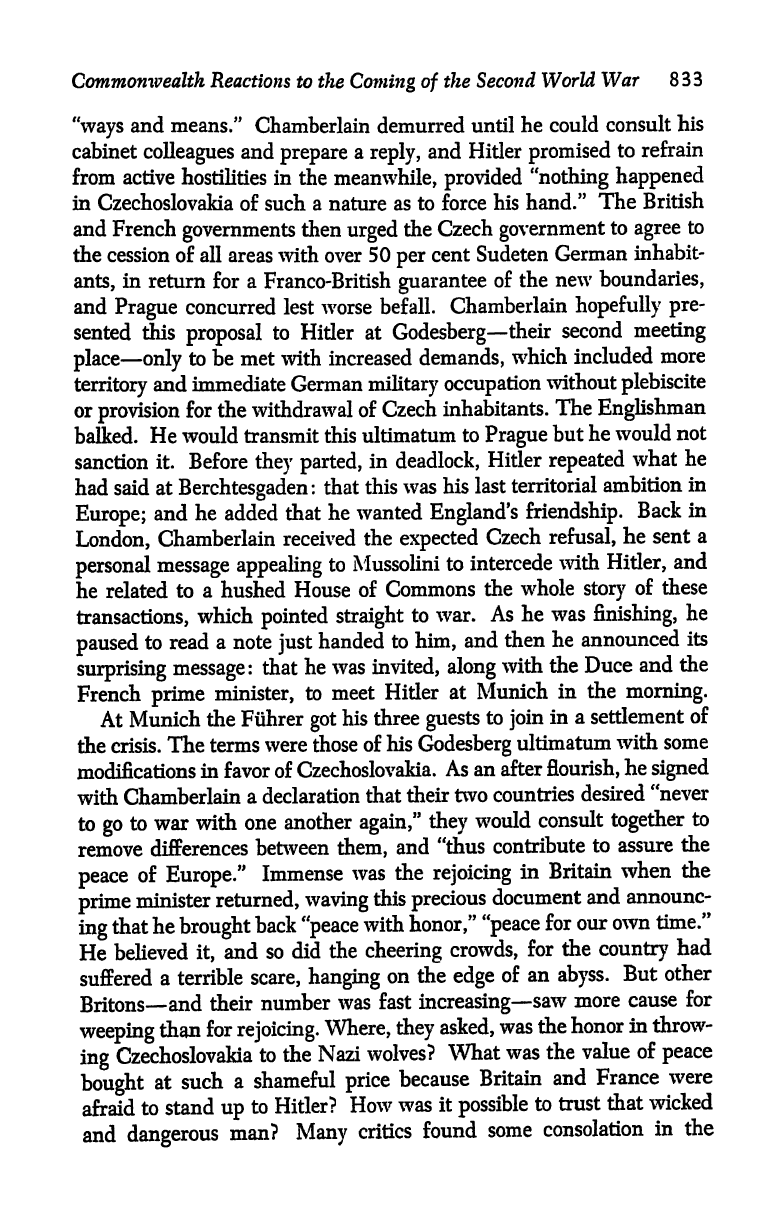
Commonwealth
Reactions
to
the
Coming
of
the
Second World
War
833
"ways
and means."
Chamberlain
demurred
until
he could
consult
his
cabinet
colleagues
and
prepare
a
reply,
and Hitler
promised
to
refrain
from active
hostilities
in
the
meanwhile,
provided
"nothing
happened
in
Czechoslovakia
of such
a
nature
as to
force his
hand."
The
British
and French
governments
then
urged
the
Czech
government
to
agree
to
the cession
of
all
areas with over
50
per
cent
Sudeten
German
inhabit-
ants,
in
return
for
a
Franco-British
guarantee
of
the
new
boundaries,
and
Prague
concurred
lest worse befall.
Chamberlain
hopefully
pre-
sented
this
proposal
to Hitler
at
Godesberg
their
second
meeting
place only
to be
met
with
increased
demands,
which
included
more
territory
and immediate
German
military
occupation
without
plebiscite
or
provision
for the withdrawal
of
Czech
inhabitants.
The
Englishman
balked.
He would
transmit
this
ultimatum
to
Prague
but
he
would
not
sanction
it.
Before
they
parted,
in
deadlock,
Hitler
repeated
what
he
had said
at
Berchtesgaden
:
that
this
was
his
last
territorial
ambition
in
Europe;
and
he added that
he
wanted
England's
friendship.
Back
in
London,
Chamberlain
received
the
expected
Czech
refusal,
he
sent
a
personal
message
appealing
to
Mussolini
to
intercede
with
Hitler,
and
he related
to
a
hushed
House
of
Commons
the
whole
story
of
these
transactions,
which
pointed
straight
to
war.
As
he
was
finishing,
he
paused
to
read a note
just
handed
to
him,
and
then
he
announced
its
surprising
message:
that
he was
invited,
along
with
the
Duce
and
the
French
prime
minister,
to
meet
Hitler
at
Munich
in
the
morning.
At
Munich
the Fiihrer
got
his three
guests
to
join
in
a
settlement
of
the
crisis.
The terms
were
those
of
his
Godesberg
ultimatum
with some
modifications
in favor of
Czechoslovakia.
As
an after
flourish,
he
signed
with Chamberlain
a
declaration
that
their two
countries
desired
"never
to
go
to
war with
one
another
again,"
they
would
consult
together
to
remove
differences
between
them,
and
"thus
contribute
to
assure
the
peace
of
Europe."
Immense
was
the
rejoicing
in
Britain
when
the
prime
minister
returned,
waving
this
precious
document
and
announc-
ing
that
he
brought
back
"peace
with
honor,"
"peace
for
our
own
time."
He
believed
it,
and
so
did
the
cheering
crowds,
for
the
country
had
suffered
a terrible
scare,
hanging
on
the
edge
of
an
abyss.
But
other
Britons
and
their
number
was
fast
increasing
saw
more
cause
for
weeping
than
for
rejoicing.
Where,
they
asked,
was the
honor
in
throw-
ing
Czechoslovakia
to
the
Nazi
wolves?
What
was
the
value
of
peace
bought
at
such
a shameful
price
because
Britain
and
France
were
afraid
to stand
up
to
Hitler?
How
was
it
possible
to
trust
that
wicked
and
dangerous
man?
Many
critics
found
some
consolation
in the
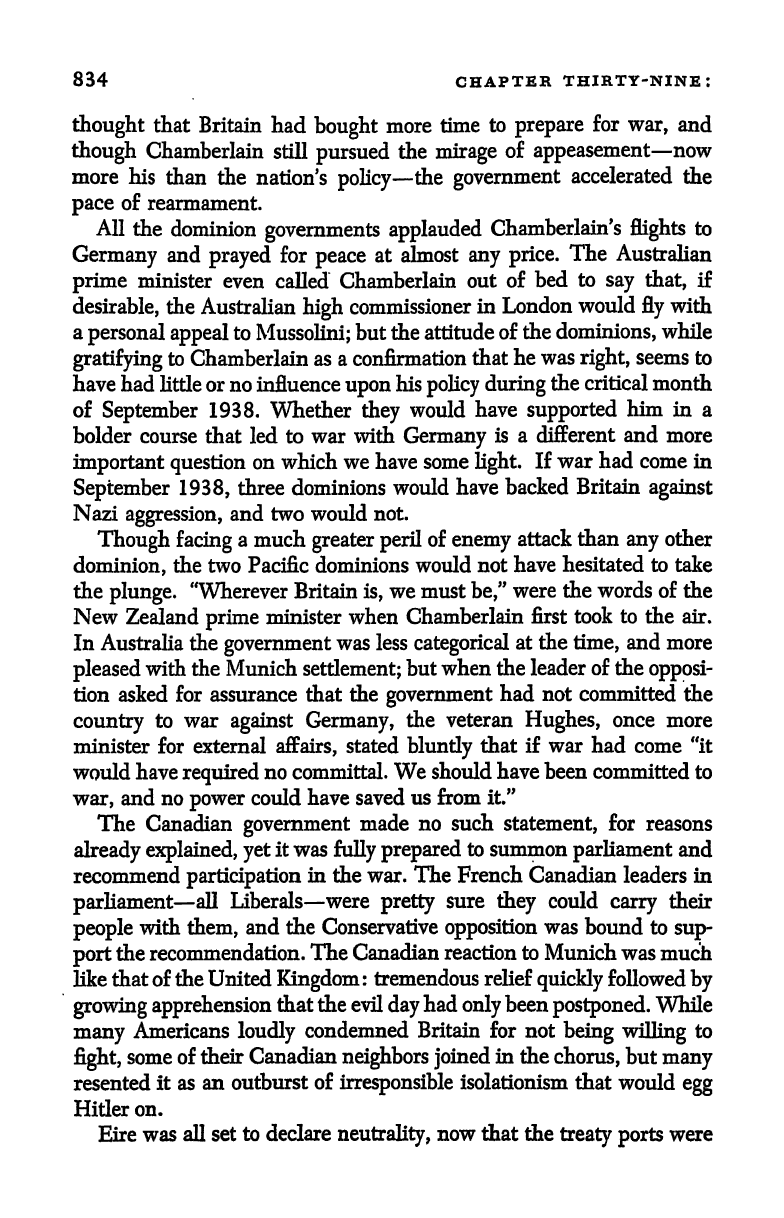
834
CHAPTER
THIRTY-NINE:
thought
that Britain
had
bought
more
time
to
prepare
for
war,
and
though
Chamberlain
still
pursued
the
mirage
of
appeasement
now
more
his than
the
nation's
policy
the
government
accelerated
the
pace
of
rearmament.
All
the
dominion
governments
applauded
Chamberlain's
flights
to
Germany
and
prayed
for
peace
at almost
any
price.
The
Australian
prime
minister
even
called
Chamberlain
out
of
bed
to
say
that,
if
desirable,
the
Australian
high
commissioner
in
London
would
fly
with
a
personal
appeal
to
Mussolini;
but
the attitude
of
the
dominions,
while
gratifying
to
Chamberlain
as a
confirmation
that
he
was
right,
seems
to
have
had little or
no
influence
upon
his
policy
during
the critical
month
of
September
1938.
Whether
they
would
have
supported
him in
a
bolder
course
that
led
to war
with
Germany
is
a different and more
important question
on
which
we have some
light.
If
war
had come
in
September
1938,
three dominions
would
have backed
Britain
against
Nazi
aggression,
and two
would
not.
Though facing
a much
greater
peril
of
enemy
attack
than
any
oilier
dominion,
the two Pacific
dominions would
not
have
hesitated to
take
the
plunge.
"Wherever
Britain
is,
we
must
be,"
were the words
of the
New
Zealand
prime
minister when Chamberlain
first
took to
the
air.
In Australia the
government
was less
categorical
at the
time,
and more
pleased
with
the
Munich
settlement;
but
when the leader
of
the
opposi-
tion
asked
for assurance
that the
government
had
not
committed the
country
to
war
against
Germany,
the veteran
Hughes,
once more
minister
for
external
affairs,
stated
bluntly
that if war
had come "it
would
have
required
no committal. We should
have been
committed to
war,
and no
power
could
have saved
us from it."
The Canadian
government
made no
such
statement,
for reasons
already
explained,
yet
it was
fully prepared
to summon
parliament
and
recommend
participation
in the war. The French
Canadian leaders in
parliament
all
Liberals
were
pretty
sure
they
could
carry
their
people
with
them,
and the Conservative
opposition
was
bound to
sup-
port
the
recommendation.
The
Canadian
reaction to
Munich was
much
like
that
of
the United
Kingdom
:
tremendous relief
quickly
followed
by
growing
apprehension
that the
evil
day
had
only
been
postponed.
While
many
Americans
loudly
condemned
Britain
for not
being
willing
to
fight,
some
of
their Canadian
neighbors joined
in
the
chorus,
but
many
resented
it as
an outburst
of
irresponsible
isolationism that
would
egg
Hitler
on.
Eire
was
all set
to declare
neutrality,
now
that
the
treaty ports
were
